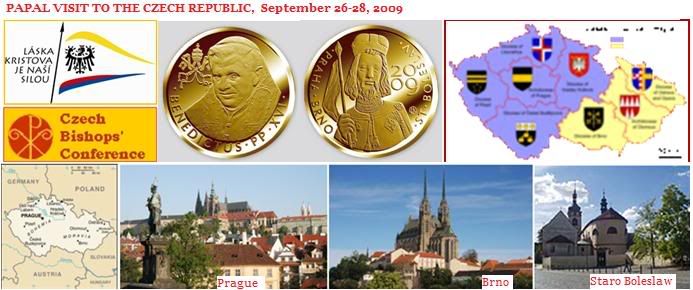 Day 3 - MASS AT STARA BOLESLAW
Day 3 - MASS AT STARA BOLESLAW
AND ENCOUNTER WITH THE YOUTH
 Below, Basilica of St. Wenceslas; and field outside Stara Boleslaw where the Mass today took place.
Below, Basilica of St. Wenceslas; and field outside Stara Boleslaw where the Mass today took place.
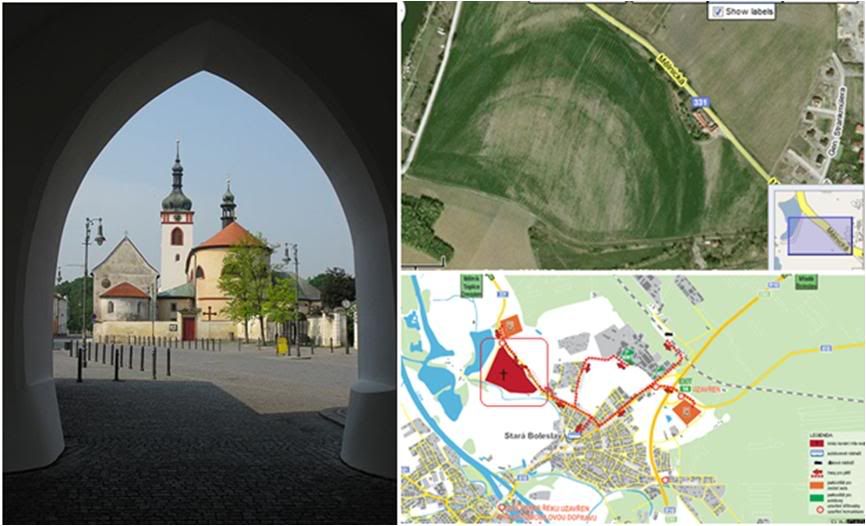
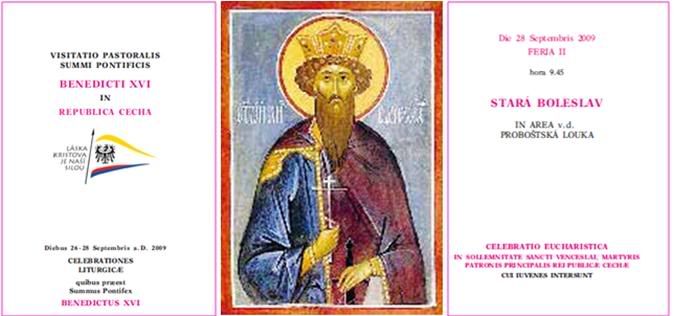 The Diocese prepared its own missal (below) for this Mass, besides the omnibus Vatican missal for the liturgical services on this trip.
The Diocese prepared its own missal (below) for this Mass, besides the omnibus Vatican missal for the liturgical services on this trip.
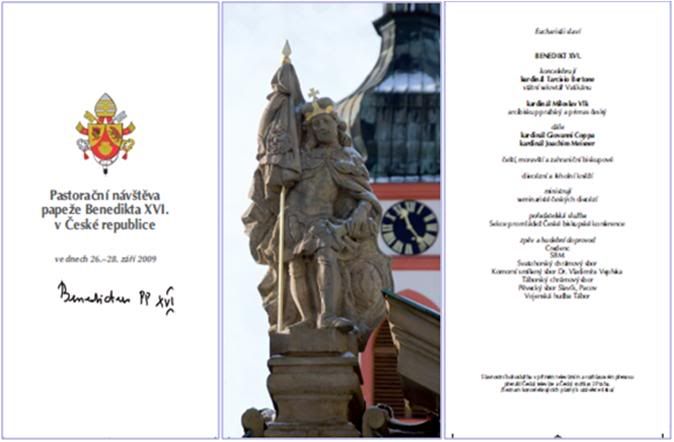
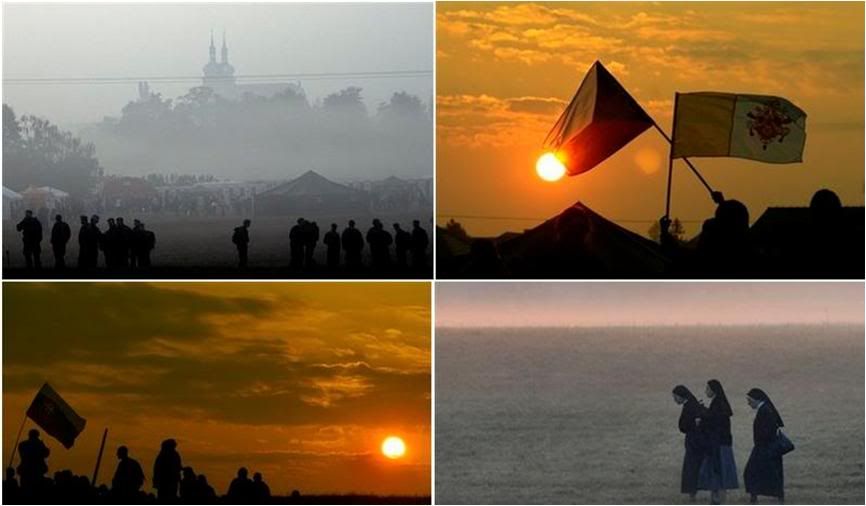
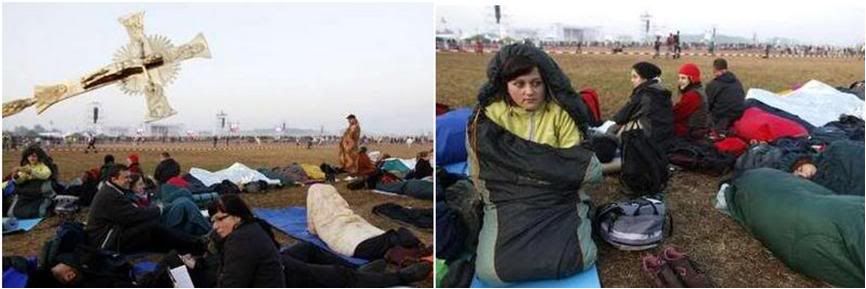 Pilgrims started arriving for the Mass before dawn, while thousands of young people camped overnight for the prayer vigil and the Mass.
Pilgrims started arriving for the Mass before dawn, while thousands of young people camped overnight for the prayer vigil and the Mass.
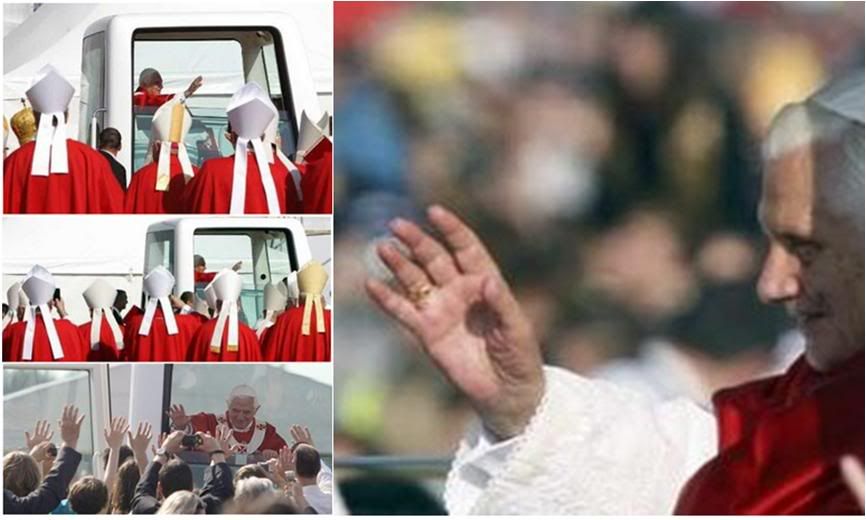
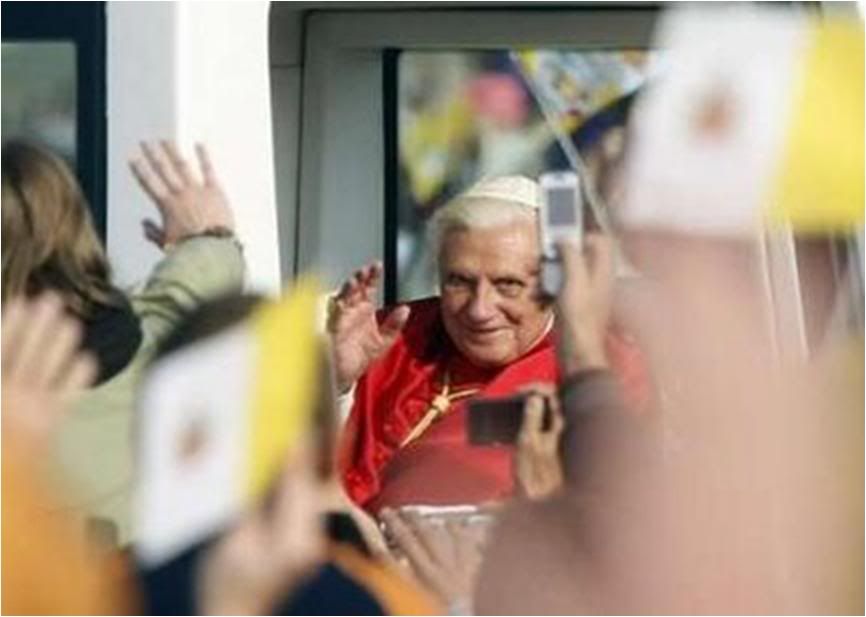
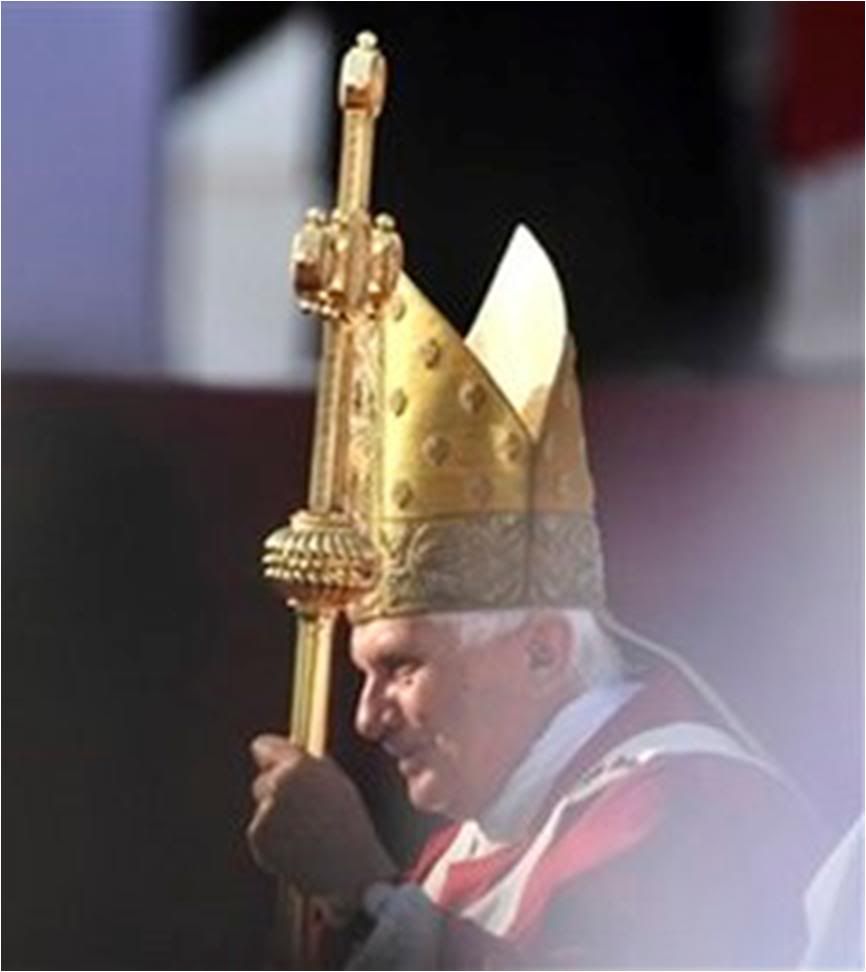 Pope wraps up Czech trip
Pope wraps up Czech trip
with Mass near Prague
By KAREL JANICEK and VICTOR L. SIMPSON

STARA BOLESLAV, Czech Republic, Sept. 28 (AP) – Pope Benedict XVI on Monday held up the Czech Republic's martyred patron saint as a model for leaders, saying the world needs God-fearing people prepared to follow the ethical principles of Christianity.
At an open-air Mass for at least 40,000 faithful, Benedict issued a call for holiness as he wrapped up his three-day visit to this central European country two decades after the fall of communism.
"The last century — as this land of yours can bear witness — saw the fall of a number of powerful figures who had apparently risen to almost unattainable heights," Benedict said, speaking in Italian.
"Suddenly they found themselves stripped of their power," he said.
Benedict said that those who deny God and appear to lead a comfortable life are in reality "sad and unfulfilled" people.
His visit, which began Saturday, came as the country prepares to mark the 20th anniversary of the 1989 Velvet Revolution, which ousted a communist regime that had ruthlessly persecuted believers and confiscated church property.
The 82-year-old Pope told believers who packed a meadow in Stara Boleslav, 25 kilometers (15 miles) northeast of Prague, that they could learn from patron St. Wenceslas, who was murdered here by his pagan brother in 935 A.D.
Wenceslas, the Pope said, was "a model of holiness for all people."
"We ask ourselves: In our day, is holiness still relevant? Or is it now considered unattractive and unimportant? Do we not place more value today on worldly success and glory? Yet how long does earthly success last, and what value does it have?" the Pope said Monday, a national holiday honoring Wenceslas.
Although his overall reception has been tepid, with no posters or billboards announcing the trip, the faithful — some from nearby Austria, Germany, Poland and Slovakia — streamed into Stara Boleslav before dawn.
The Vatican said 40,000 people turned out; Czech organizers put the crowd estimate at 50,000.
"It's important for us to show that we're not just an atheist nation and that there are believers here," said Lukas Jasa, 21, who traveled with friends from the eastern Czech Republic — more than 300 kilometers (200 miles) — to glimpse the Pope.
Czechs are among Europe's most secular people.
In 1991, 4.5 million of the country's 10 million people said they belonged to a church, but a 2001 census showed that number had plunged to 3.3 million. Recent surveys suggest the number of believers remains low; about one in two respondents to a poll conducted by the agency STEM said they don't believe in God.
Benedict has used his pilgrimage to recall the evils of communist-era religious repression and to coax indifferent Czechs back to the church.
In a special message to young people, the Pope urged them not to be seduced by consumerism.
"Unfortunately, many of your contemporaries allow themselves to be led astray by illusory visions of spurious happiness, and then they find themselves sad and alone," Benedict said.
Yet throughout the trip, he has carefully avoided wading into abortion, gay marriage and other controversial issues — an apparent attempt to avoid further antagonizing already apathetic Czechs.
In November, Czechs will mark two decades since the country peacefully shook off communist rule.
Anna Bozkova, 76, said the Pope's visit comes "at a hard time."
"Everybody can feel it," she said. "(The Pope) is welcomed in all other states. Faith was common for my generation. It survived the Communist era. We were marginalized, but we maintained our faith because it's strong."
On Sunday, an estimated 120,000 cheering pilgrims greeted Benedict at an open-air Mass in the southern city of Brno, a Catholic stronghold.
There, the German-born pope broadened his message to all of Europe, appealing to people across the continent to remember their Christian heritage.
The Pope, who has been giving his speeches in either English or Italian, is making his first foreign trip since he broke his right wrist in a fall while on vacation in July. He told reporters aboard his plane that he is finally able to write again and hopes to complete a new book by next spring.
Before Monday's Mass, Benedict stopped at a shrine to St. Wenceslas, where he blessed the martyr's skull and other relics.
The Pope was to return to Prague for lunch with Czech bishops before leaving for Rome late in the afternoon.
Simpson reported from Prague. Associated Press Writer William J. Kole in Prague contributed to this report.
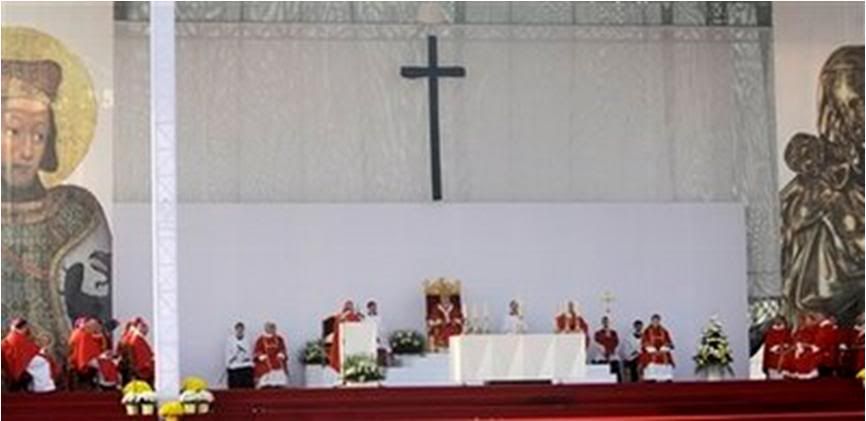
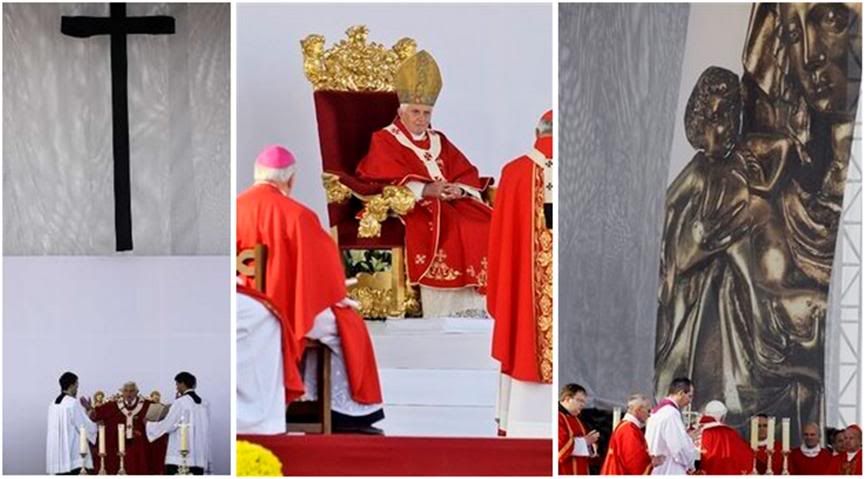
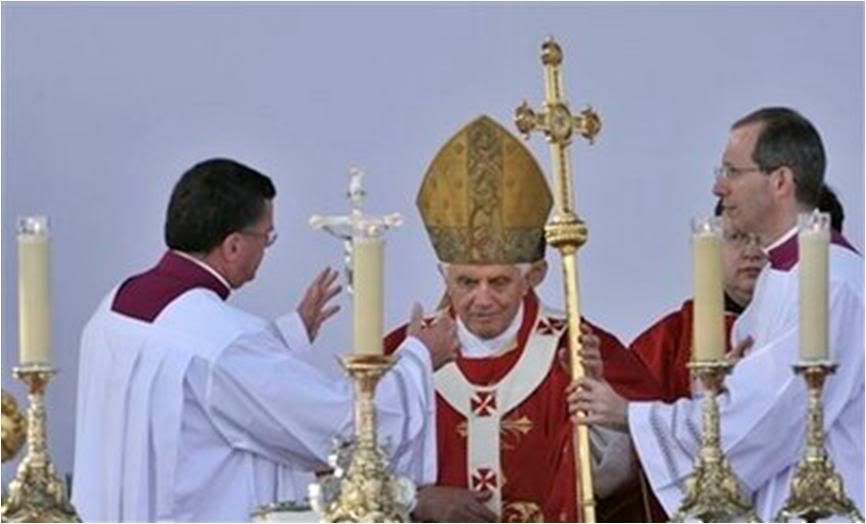
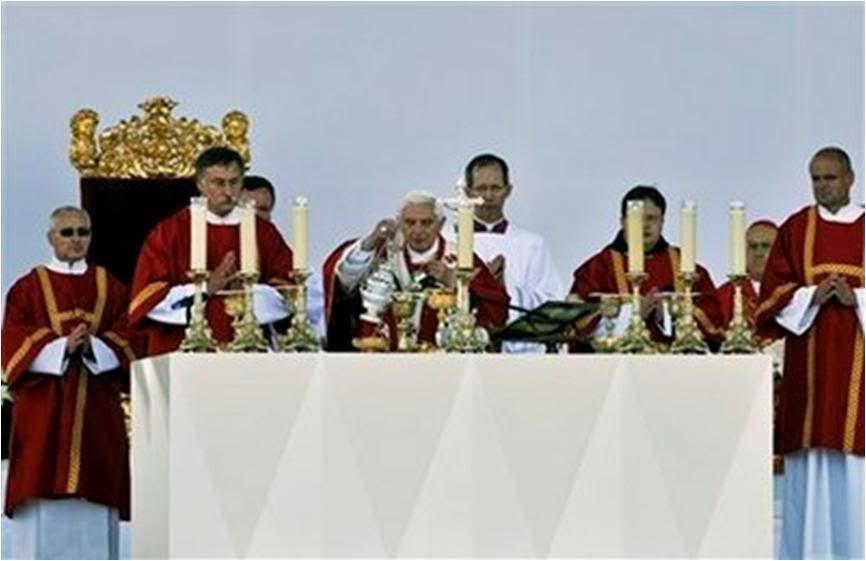
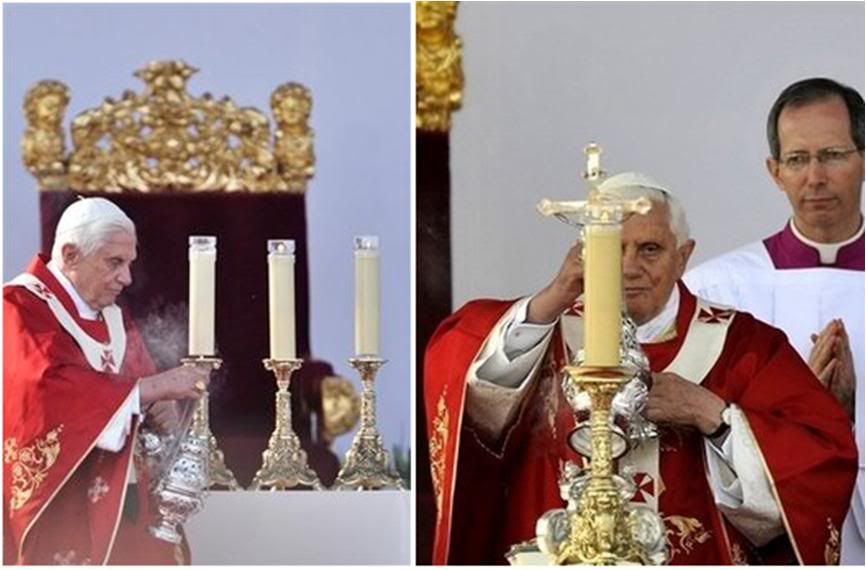
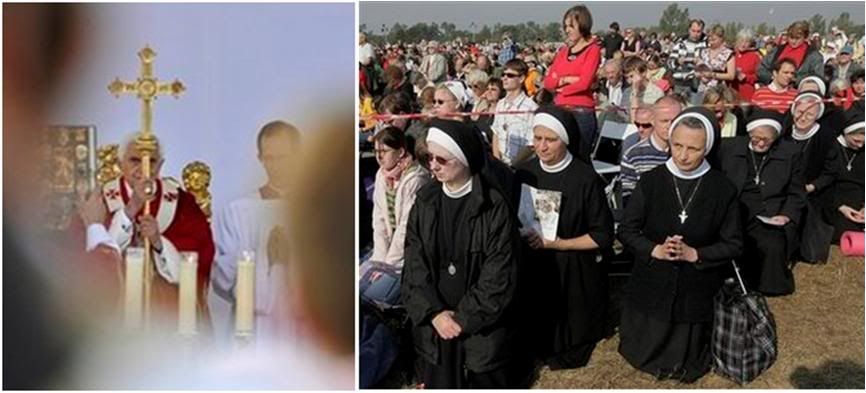
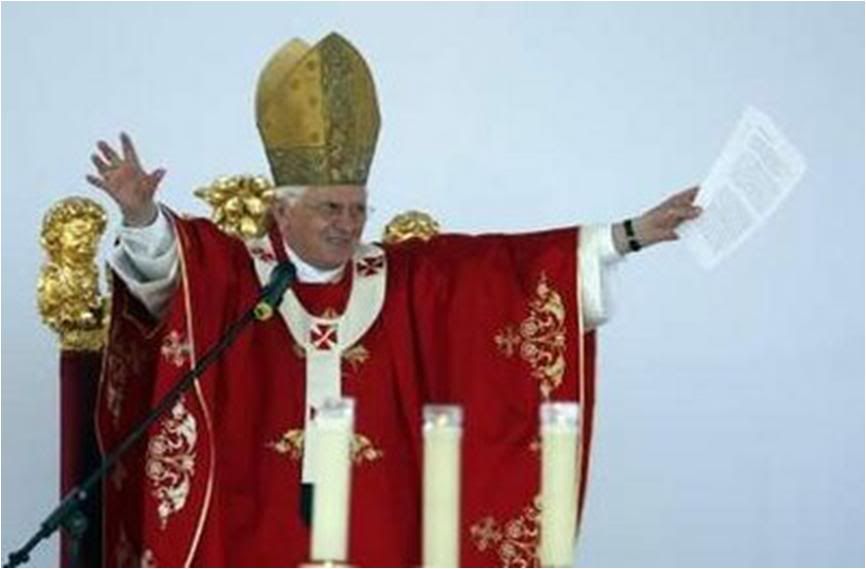
THOLY FATHER'S HOMILY
Dear Cardinals,
My Brother Bishops and Priests,
Brothers and Sisters in Christ,
Dear Young People,
It gives me great joy to be with you this morning, as my apostolic visit to the beloved Czech Republic draws to a close, and I offer all of you my heartfelt greeting, especially the Cardinal Archbishop, to whom I am grateful for the words that he addressed to me in your name at the start of Mass.
My greeting goes also to the other Cardinals, the Bishops, the priests and consecrated persons, the representatives of lay movements and associations, and especially the young people.
I respectfully greet the President of the Republic, to whom I offer cordial good wishes on the occasion of his name-day; and I gladly extend these wishes to all who bear the name of Wenceslaus [CVaclav in Czech] and to the entire Czech people on the day of this national feast.
This morning, we are gathered around the altar for the glorious commemoration of the martyr Saint Wenceslaus, whose relics I was able to venerate before Mass in the Basilica dedicated to him.
He shed his blood in your land, and his eagle, which – as the Cardinal Archbishop has just mentioned – you chose as a symbol for this visit, constitutes the historical emblem of the noble Czech nation.
This great saint, whom you are pleased to call the “eternal” Prince of the Czechs, invites us always to follow Christ faithfully, he invites us to be holy. He himself is a model of holiness for all people, especially the leaders of communities and peoples.
Yet we ask ourselves: In our day, is holiness still relevant? Or is it now considered unattractive and unimportant? Do we not place more value today on worldly success and glory? Yet how long does earthly success last, and what value does it have?
The last century – as this land of yours can bear witness – saw the fall of a number of powerful figures who had apparently risen to almost unattainable heights. Suddenly they found themselves stripped of their power.
Those who denied and continue to deny God, and in consequence have no respect for man, appear to have a comfortable life and to be materially successful. Yet one need only scratch the surface to realize how sad and unfulfilled these people are.
Only those who maintain in their hearts a holy “fear of God” can also put their trust in man and spend their lives building a more just and fraternal world.
Today there is a need for believers with credibility, who are ready to spread in every area of society the Christian principles and ideals by which their action is inspired. This is holiness, the universal vocation of all the baptized, which motivates people to carry out their duty with fidelity and courage, looking not to their own selfish interests but to the common good, seeking God’s will at every moment.
In the Gospel we heard Jesus speaking clearly on this subject: “What will it profit a man, if he gains the whole world and forfeits his life?” (Mt 16:26).
In this way we are led to consider that the true value of human life is measured not merely in terms of material goods and transient interests, because it is not material goods that quench the profound thirst for meaning and happiness in the heart of every person.
This is why Jesus does not hesitate to propose to his disciples the “narrow” path of holiness: “Whoever loses his life for my sake will find it” (16:25). And he resolutely repeats to us this morning: “If any man would come after me, let him deny himself and take up his cross and follow me” (16:24).
Without doubt, this is hard language, difficult to accept and put into practice, but the testimony of the saints assures us that it is possible for all who trust and entrust themselves to Christ. Their example encourages those who call themselves Christian to be credible, that is, consistent with the principles and the faith that they profess.
It is not enough to appear good and honest: one must truly be so. And the good and honest person is one who does not obscure God’s light with his own ego, does not put himself forward, but allows God to shine through.
This is the lesson we can learn from Saint Wenceslaus, who had the courage to prefer the kingdom of heaven to the enticement of worldly power. His gaze never moved away from Jesus Christ, who suffered for us, leaving us an example that we should follow in his steps, as Saint Peter writes in the second reading that we just heard.
As an obedient disciple of the Lord, the young prince Wenceslaus remained faithful to the Gospel teachings he had learned from his saintly grandmother, the martyr Ludmila.
In observing these, even before committing himself to build peaceful relations within his lands and with neighbouring countries, he took steps to spread the Christian faith, summoning priests and building churches.
In the first Old Slavonic “narration”, we read that “he assisted God’s ministers and he also adorned many churches” and that “he was benevolent to the poor, clothed the naked, gave food to the hungry, welcomed pilgrims, just as the Gospel enjoins. He did not allow injustice to be done to widows, he loved all people, whether poor or rich”.
He learned from the Lord to be “merciful and gracious” (Responsorial Psalm), and animated by the Gospel spirit he was even able to pardon his brother who tried to kill him. Rightly, then, you invoke him as the “heir” of your nation, and in a well-known song, you ask him not to let it perish.
Wenceslaus died as a martyr for Christ. It is interesting to note that, by killing him, his brother Boleslaus succeeded in taking possession of the throne of Prague, but the crown placed on the heads of his successors did not bear his name.
Rather, it bears the name of Wenceslaus, as a testimony that “the throne of the king who judges the poor in truth will remain firm for ever” (cf. today’s Office of Readings).
This fact is judged as a miraculous intervention by God, who does not abandon his faithful: “the conquered innocent defeated the cruel conqueror just as Christ did on the cross” (cf. The Legend of Saint Wenceslaus), and the blood of the martyr did not cry out for hatred or revenge, but rather for pardon and peace.
Dear brothers and sisters, together let us give thanks to the Lord in this Eucharist for giving this saintly ruler to your country and to the Church. Let us also pray that, like him, we too may walk along the path of holiness.
It is certainly difficult, since faith is always exposed to multiple challenges, but when we allow ourselves to be drawn towards God who is Truth, the path becomes decisive, because we experience the power of his love.
May the intercession of Saint Wenceslaus and of the other patron saints of the Czech Lands obtain this grace for us. May we always be protected and assisted by Mary, Queen of Peace and Mother of Love. Amen!
THE POPE'S MESSAGE
FOR CZECH YOUTH
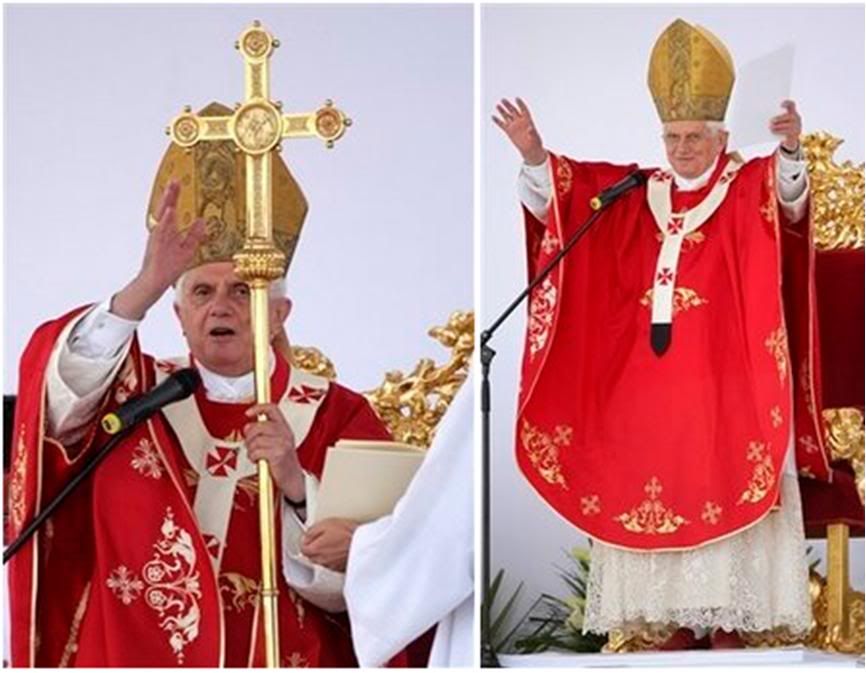
The Pope's visit to Stara Boleslaw was planned so that it would also provide the opportunity for his encounter with the young people of Czechoslovakia. Such an encounter has been a regular feature of his trips outside Rome.
Right after the Mass, he addressed the youth separately. Here is the text of the message delivered in English:
Dear Young Friends,
At the conclusion of this celebration I turn to you directly and I greet you warmly. You have come here in great numbers from all over the country and from neighbouring countries; you camped here yesterday evening and you spent the night in tents, sharing an experience of faith and companionship.
Thank you for your presence here, which gives me a sense of the enthusiasm and generosity so characteristic of youth. Being with you makes the Pope feel young! I extend a particular word of thanks to your representative for his words and for the wonderful gift.
Dear friends, it is not hard to see that in every young person there is an aspiration towards happiness, sometimes tinged with anxiety: an aspiration that is often exploited, however, by present-day consumerist society in false and alienating ways.
Instead, that longing for happiness must be taken seriously, it demands a true and comprehensive response. At your age, the first major choices are made, choices that can set your lives on a particular course, for better or worse.
Unfortunately, many of your contemporaries allow themselves to be led astray by illusory visions of spurious happiness, and then they find themselves sad and alone. Yet there are also many young men and women who seek to transform doctrine into action, as your representative said, so as to give the fullness of meaning to their lives.
I invite you all to consider the experience of Saint Augustine, who said that the heart of every person is restless until it finds what it truly seeks. And he discovered that Jesus Christ alone is the answer that can satisfy his and every person’s desire for a life of happiness, filled with meaning and value (cf. Confessions, I.1.1).
As he did with Augustine, so the Lord comes to meet each one of you. He knocks at the door of your freedom and asks to be welcomed as a friend. He wants to make you happy, to fill you with humanity and dignity.
The Christian faith is this: encounter with Christ, the living Person who gives life a new horizon and thereby a definitive direction. And when the heart of a young person opens up to his divine plans, it is not difficult to recognize and follow his voice.
The Lord calls each of us by name, and entrusts to us a specific mission in the Church and in society. Dear young people, be aware that by Baptism you have become children of God and members of his Body, the Church.
Jesus constantly renews his invitation to you to be his disciples and his witnesses. Many of you he calls to marriage, and the preparation for this Sacrament constitutes a real vocational journey. Consider seriously the divine call to raise a Christian family, and let your youth be the time in which to build your future with a sense of responsibility. Society needs Christian families, saintly families!
And if the Lord is calling you to follow him in the ministerial priesthood or in the consecrated life, do not hesitate to respond to his invitation. In particular, in this Year of Priests, I appeal to you, young men: be attentive and open to Jesus’s call to offer your lives in the service of God and his people.
The Church in every country, including this one, needs many holy priests and also persons fully consecrated to the service of Christ, Hope of the world.
Hope! This word, to which I often return, sits particularly well with youth. You, my dear young people, are the hope of the Church! She expects you to become messengers of hope, as happened last year in Australia, during World Youth Day, that great manifestation of youthful faith that I was able to experience personally, and in which some of you took part. Many more of you will be able to come to Madrid in August 2011. I invite you here and now to participate in this great gathering of young people with Christ in the Church.
Dear friends, thank you again for being here and thank you for your gift: the book of photographs recounting the lives of young people in your dioceses.
Thank you also for the sign of your solidarity towards the young people of Africa, which you have presented to me. The Pope asks you to live your faith with joy and enthusiasm; to grow in unity among yourselves and with Christ; to pray and to be diligent in frequenting the sacraments, especially the Eucharist and Confession; to take seriously your Christian formation, remaining ever obedient to the teachings of your Pastors.
May Saint Wenceslaus guide you along this path through his example and his intercession, and may you always enjoy the protection of the Virgin Mary, Mother of Jesus and our Mother. I bless all of you with affection!
He then took the occasion to give his usual plurilingual greetings, this time, to those who had come from neigboring countries. First, the Slovenians:
I extend a warm welcome to the pilgrims who have come from Slovakia, especially the young people. Dear young people, dear brothers and sisters, I thank you for your presence at today’s celebration. Do not forget: let the love of God be your strength! I gladly bless you and your loved ones. May Jesus Christ be praised!
Then, the Poles:
I address a word of greeting to the Poles here present, and especially to the young who have come to join their Czech brothers and sisters in a spirit of warm friendship. Support one another by a joyful testimony of faith, growing in Christ’s love and in the power of the Holy Spirit, so as to reach the fullness of humanity and holiness. May God bless you!]
And his German countrymen:
I offer warm greetings to the young people and to all the pilgrims who have come from neighbouring German-speaking countries. Thank you for your presence! Your participation in this feast of faith and hope is a sign that you are seeking answers to your questions and inner desires in Jesus Christ and in the community of the Church.
Christ himself is the way, the truth and the life (cf. Jn 14:6). He is the foundation that truly supports our life. On this firm basis, Christian families can be raised and young people can respond to their vocation to the priesthood and the consecrated life.
Personal friendship with Christ fills us with genuine, lasting joy and makes us ready to put into effect God’s plan for our life. To this end, I invoke upon all of you the assistance of the Holy Spirit.
He concluded in Czech:
Dear young friends, your enthusiasm for the Christian faith is a sign of hope for the Church that is present and active in these lands. In order to give a fuller meaning to your youth, follow the Lord Jesus with courage and generosity as he knocks on the door of your hearts. Christ asks you to welcome him as a friend. May the Lord bless you and bring to fulfilment every good plan that you make for your lives!
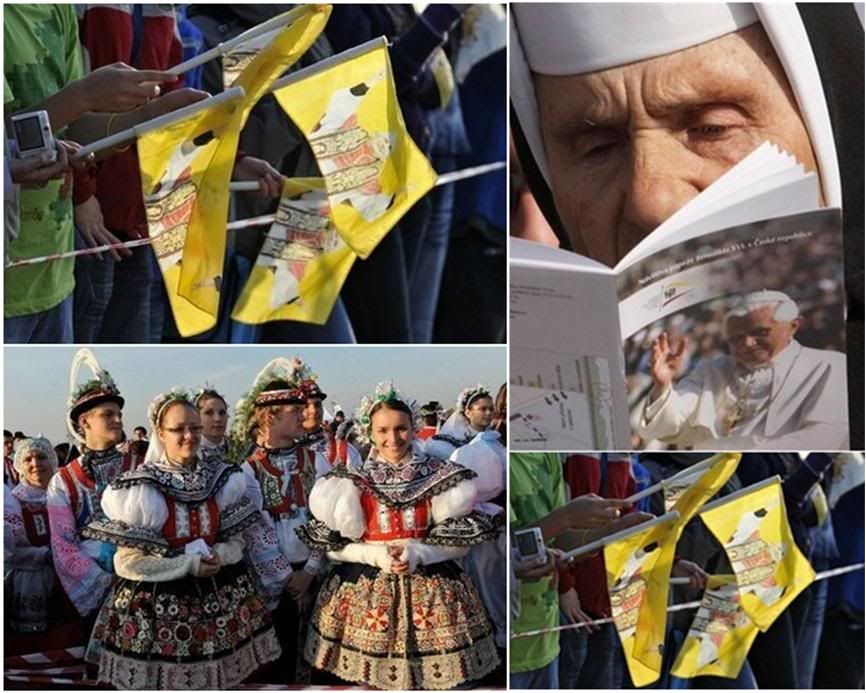
[Modificato da TERESA BENEDETTA 02/10/2009 18:12]